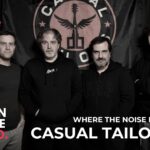Now Reading: Stephan Folkes Forged Fire from Resilience: An Interview –
-
01
Stephan Folkes Forged Fire from Resilience: An Interview –
Stephan Folkes Forged Fire from Resilience: An Interview –

Stephan Folkes’ debut LP Hazard may be independently produced and self-funded, but its emotional resonance places it firmly among the most striking introductions of recent years. In this interview, Folkes reflects on the album’s conceptual depth, which navigates grief, resilience, self-preservation, and empowerment with a raw honesty that resists the polished moulds of mainstream music.
The discussion ranges from the bold dual release of Is This Paradise? and It’s None of Your Business to the challenges of independence, the importance of authenticity, and his commitment to self-investment as both an artist and individual. With reflections on collaboration, family influences, live ambitions, and even the gym as a creative catalyst, this conversation captures an artist intent on shaping a path on his own terms, uncompromised and fuelled by conviction.
Q1. Hazard is such a bold debut LP—each track tells its own truth, but together they hold a mirror up to resilience, grief, identity, and inner power. When you look back at the making of the album, what emotional or creative threshold do you feel you crossed in the process?
A: Hazard is my debut album — a bold, conceptually and emotionally charged body of work that explores pain, resilience, relationships, and inner strength. Each track represents a different chapter of my journey, blending raw truth with experimental, genre-blurring sounds. At its core, my album is about self-preservation. It reflects my experiences with adversity, self-discovery, and learning how to empower myself and others through it all. I wanted Hazard to feel like both a release and a revelation — something honest, cinematic, and deeply personal.
Q2. You released Is This Paradise? and It’s None of Your Business alongside the album—each carrying its own weight and message. What made you decide to release them in tandem, and how do they expand the album’s universe?
A: I chose to release Is This Paradise? and It’s None of Your Business alongside my album Hazard to build on the momentum of my previous singles, increase visibility for my album, and further solidify my artistic brand. Each track holds a distinct and meaningful place within my catalogue: Is This Paradise? reflects on grief, loss, and the challenges of living with — rather than erasing — the past, recognising how it shapes both the present and the future. In contrast, It’s None of Your Business is a bold, self-explanatory statement about the value of privacy in a world where people often feel entitled to personal details, challenging the assumption that secrecy implies wrongdoing. Together, these songs expand my album’s universe by reinforcing its central themes of self-investment, personal boundaries, and empowerment.
Q3. Since Hazard dropped, how has your perspective shifted—either as a songwriter, producer, or even just as a person in the thick of independent music? Has anything surprised you about the reaction to the record?
A: Since Hazard was released, my perspective has grown both creatively and personally. As a singer, songwriter, producer, sound engineer and more, I’ve become more confident in trusting my instincts and embracing the uniqueness of my sound, even when it may not fit perfectly into a single genre. Being “in the thick of independent music” has also deepened my understanding of the business side — from marketing strategies to building long-term audience relationships and strengthening my brand. I’ve been encouraged by the depth of connection listeners have shared with me; people have resonated with my album’s themes of self-investment and empowerment in ways I hoped they would. That kind of genuine response has reinforced my conviction that authenticity in music will always find its audience.
Q4. You’ve clearly laid down foundations with care, self-funding everything and making deliberate artistic choices. With your next wave of releases on the horizon, what directions are calling you creatively? Are there themes or sounds you’re feeling drawn to explore next?
A: At this stage, I’m looking to step more into live performances, as much of my work so far has focused on building my presence through social media — which remains one of the most powerful platforms for artists today. Moving forward, I’ll be sending my music to more bookers to secure shows and connect with audiences in person. I’m also deep into work on my next album, which will carry forward some of Hazard’s core themes — self-investment and empowerment — while expanding into an edgier, darker sound, drawing on dark pop and dark dream pop influences. I never want to remain in a comfort zone; I deliberately place myself in situations I consider essential for challenging me both creatively and personally, because that’s where true growth happens. The project is planned for release in 2026, and I’m excited to share this next chapter of my sound.
Q5. Your ethos—rejecting conformity and spotlighting vulnerability—hits differently in a world obsessed with polish and perfection. How do you personally navigate reactions to your work, whether it’s deep appreciation or outright critique?
A: For me, the only truly objective elements in music are things like key, pitch, timing, and perhaps rhythm. Everything beyond that is subjective — simply someone’s opinion. I create based on instinct, and I’m aware that much of the music industry is highly manufactured. There are people in positions of power who have a fixed idea of what music should sound like, and they often try to influence both artists and audiences to fit that mould. Some will even present themselves as supporters while quietly steering artists toward making music in a certain way. This can create an artificial environment where mainstream releases often sound very similar. I’ve spoken with people behind the scenes who’ve confirmed how much of this goes on, which is why I value the independent scene — to me, it’s far more creative, authentic, and open to experimentation.
Most people who hear my work respond positively, but I believe that if an artist can’t find an audience that truly loves their music — people who would buy it today, attend their shows, share it with others, and champion their brand — then it might be worth reassessing their music itself. That said, I don’t dwell on criticism because my music is my art, and I stand by it completely. Not every art form resonates with everyone, and that’s fine. For example, while I personally don’t enjoy Adele’s music — it’s simply not to my taste — she has clearly connected with millions of people around the world, won multiple Grammys, and built incredible success. That’s the beauty of music: different styles speak to different audiences, and there’s space for all of it
Q6. You’ve got strong roots in your community, and with your cousin Deyaz rising in the UK scene and Mizzy stirring conversation on social platforms, how have those family dynamics influenced your approach to art and visibility?
A: My cousin Deyaz is also a UK artist. Although we’re no longer in contact, watching someone from my own bloodline carve their own path in music has shaped my perspective. His journey made me reflect on mine — and while he achieved early success, my route has been entirely different: grassroots, self-funded, self-managed, and built from the ground up. My investment in Hazard wasn’t just financial; it was a statement of conviction in myself, my vision, and the message I stand for.
When it comes to Mizzy — who is my half-niece’s half-brother, so not someone I’m directly related to — he was brought up with good values. The last conversation I had with him was about his approach, and he told me it was part of his plan to cause a stir to gain attention. He has been heavily shaped by social media, which can be both a blessing and a curse. I recognise that we’re very different people. I’m not here to downplay anyone else’s success, but what sets me apart is that I live by an approach I consider truly authentic — not in the overused, buzzword sense, but in the way I refuse to let external factors dictate who I am. I trust my instincts, choose my own direction, and don’t conform to what people think I should be. When people engage with my brand, they know it’s me — unfiltered, uncompromised, and not the product of behind-the-scenes conditioning or carefully scripted talking points. That honesty resonates, and it’s the foundation of how I connect with my audience
Q7. From being mentored by Claude Alexander to collaborating with names like Nick Michaels and Phil Curran, your circle seems built on mutual respect rather than trend-chasing. What qualities do you look for in a collaborator, and what keeps you grounded through it all?
A: I prefer to work within a small, close-knit team because it keeps the process efficient, focused, and true to my vision. I look for collaborators who resonate with me and my work — people who have full conviction in my brand, respect my individuality, and aren’t trying to mould me into something I’m not. I’m drawn to those who share my rejection of overly manufactured music and value authenticity in the creative process. Collaboration, for me, is about mutual respect: I recognise and value their strengths, they recognise mine, and we both bring qualities to the table that the other might not have. This creates a balanced, cohesive structure where we’re building each other up — and that foundation allows my music to sound the way it does today.
Q8. Your sound shifts from sensuality to soul-searching to something almost otherworldly, like in Somebody Out There?. Beyond music, where do you go—to spaces, people, or rituals—when you need to recharge or reconnect with your purpose?
A: When I need to recharge, I often go to my local park to connect with nature and clear my head. I also spend a lot of my time in the gym, which is more than just physical training for me — it’s euphoric, and it’s where my mind opens up creatively. As a Level 3 industry-standard fitness instructor, currently building on my CPD (Continuing Professional Development), I understand how to maintain and improve my mental health and create that sense of euphoria. That’s often when the best ideas come, even if I’m feeling uplifted and end up writing something more melancholic — the emotional contrast can be powerful.
I also enjoy video games, which have inspired some of my concepts and ideas. For me, life beyond music is about fully enjoying the time I have — there’s no confirmed afterlife, so I want to make the most of this one. Whether it’s training, walking in nature, or getting immersed in a game, these activities keep me balanced and fuel my creativity in ways that go beyond the music studio.
–
Stream Stephan Folkes’ new LP on all major platforms via this link.
Connect with the artist on Instagram and TikTok.
Interview by Amelia Vandergast


























